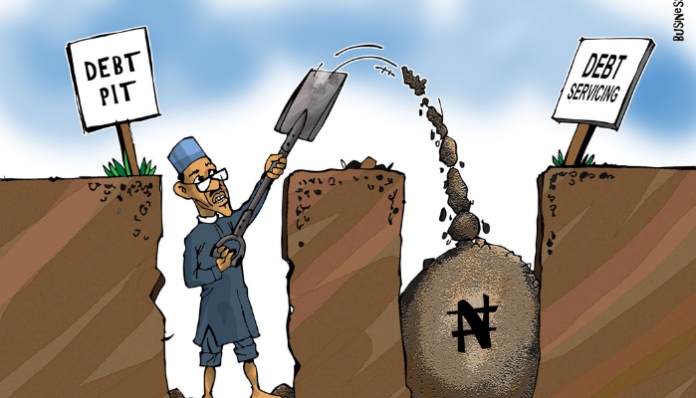National debt shoots up to N46.25tr, up from N39,55tr
By Jeph Ajobaju, Chief Copy Editor
Nigeria’s debt, comprising domestic and external debts of the federal and 36 state governments as well as the Federal Capital Territory (FCT), increased to N46.25 trillion ($103.11 billion) in the fourth quarter of 2022 (Q4 2022).
The National Bureau of Statistics (NBS) confirmed this in its latest Nigerian Domestic and Foreign Debt Report for Q4 2022 released in Abuja.
The report shows public debt grew 4.96 per cent in Q4 2022, with external debt at N18.70 trillion ($41.69 billion) and domestic debt N27.55 trillion ($61.41 billion).
External debt amounted to 40.44 per cent and domestic debt 59.56 per cent, the NBS said, according to the News Agency of Nigeria (NAN), per reporting by Vanguard.
Federal government’s share of domestic debt was 80.62 per cent in Q4 2022.
_________________________________________________________________
Related articles:
CBN recovers N3.7tr from N9.3tr business loans
CSOs alert Buhari’s reckless borrowing may cost Nigeria foreign assets
Oil money losses can fund Buhari’s projects without loans
__________________________________________________________________
Top three indebted states
The report listed the three states with the highest debt in 2022 as:
- Lagos – N807.21 billion
- Delta – N304.25 billion
- Ogun – N270.45 billion
Bottom three indebted states
The three states with the lowest debt are:
- Katsina – N62.37 billion
- Kebbi – N61.31 billion
- Jigawa – N43.95 billion
Nigeria’s public debt in 2021 was N39,556 trillion ($95.779 billion), up from N32.915 trillion ($86.392 billion) in 2020.
Lawmakers approve Buhari’s request for $973.47b Chinese loan
Federal lawmakers last month approved Muhammadu Buhari’s request to borrow $973,474,971.38 from China Development Bank after the China-Exim Bank rejected a $22,798,446,773 loan request the National Assembly (NASS) approved.
House of Representatives Rules and Business Committee Chairman, Abubakar Fulata, moved a motion for the chamber to amend its resolution granting approval for the failed loan deal.
He said: “The House notes that the 2016–2018 Federal Government External Borrowing (Rolling) Plan was approved by the Senate and the House of Representatives on March 5, 2020, and June 2, 2020, respectively.
“The House recalls that the National Assembly approved the sum of $22,798,446,773 only under the 2016–2018 Medium Term External Borrowing (Rolling) plan.
“The House is aware of the communications from the Federal Ministry of Finance requesting approval of modifications to the financing proposal for the Nigerian Railway Modernisation Project (Kaduna–Kano segment) occasioned by the COVID–19 pandemic, whereof China Exim Bank withdrew its support to finance the project.”
Conditions for loan
“The House is also aware that to secure funds for the project, the contractor (CCECC Nigeria Limited), in collaboration with the Federal Ministry of Transportation, engaged China Development Bank as the new financier in the sum of $973,474,971.38 only,” Fulana said.
He urged the House to “rescind its decision on the financier and harmonised terms and approve the change of financier from China Exim Bank to China Development Bank.” The lawmakers unanimously agreed.














